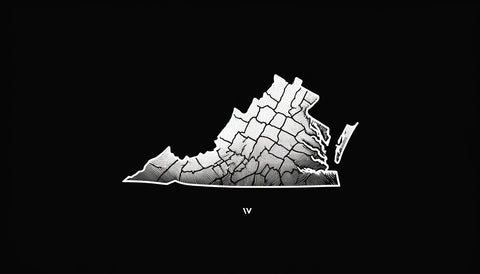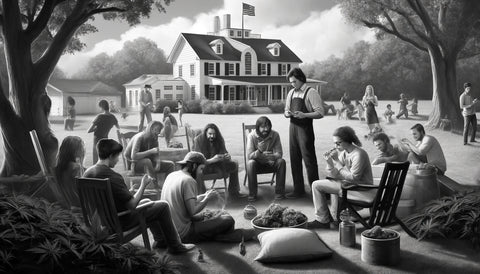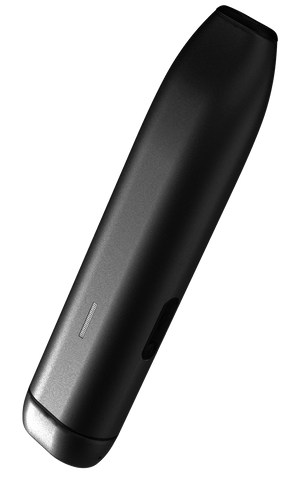In Virginia, a state already navigating the complexities of marijuana decriminalization, Governor Glenn Youngkin recently vetoed a pivotal bill that would have established a regulated retail marijuana market. This post delves into the contentious decision, exploring the backdrop of Virginia's evolving legal landscape, the specifics of the vetoed legislation, and the broader implications of this decision on the state's political, economic, and social fabric. As we unpack the governor's rationale and the vehement reactions from various stakeholders, we'll also consider what the future holds for marijuana legislation in Virginia.
The History of Cannabis Legalization in Virginia

Virginia's journey towards cannabis legalization, both medical and recreational, reflects a dynamic shift in societal attitudes and legal frameworks over several decades.
Medical Cannabis
Virginia's history with medical cannabis dates back to 1979, when it became one of the first states to legalize cannabis for medical purposes, specifically for the treatment of glaucoma and the side effects of chemotherapy. However, due to federal restrictions and the lack of a state-regulated dispensary system, this early legislation was largely symbolic and underutilized for many years.
The modern era of medical cannabis in Virginia began to take shape more concretely in 2015 with significant legislative changes. In that year, Governor Terry McAuliffe signed legislation allowing the use of cannabidiol oil (CBD) and THC-A oil for treating epilepsy. This marked a turning point, providing legal protections and beginning to establish a framework for access to medical cannabis products. By 2018, the state had approved the establishment of its first medical cannabis dispensaries, and in 2020, the Virginia Board of Pharmacy began issuing permits to companies for the production and sale of medical cannabis, finally operationalizing the earlier laws (Wikipedia).
Recreational Cannabis
The movement towards recreational cannabis legalization gained momentum in 2021, when Virginia became the first Southern state to legalize marijuana for adult use. This landmark legislation allowed adults aged 21 and over to possess and cultivate marijuana for personal use. The law reflected changing attitudes toward cannabis and aimed to reduce the burdens of criminal penalties associated with marijuana use, which had disproportionately affected minority communities.
However, the establishment of a regulated retail market for recreational cannabis faced significant political challenges. Initial efforts to set up a commercial sales framework were stymied by shifts in political power and opposition from some state leaders. Retail sales were delayed multiple times, reflecting ongoing political contention and differing views on the best approach to regulation and control of the market. Despite these challenges, the state legislature continued to push for the establishment of a regulated market, aiming for a start date in 2024, recognizing the potential for significant tax revenue and economic benefits (CFAH).
Throughout its history, Virginia's approach to cannabis has evolved from tentative medical allowances to a more comprehensive embrace of both medical and recreational use, signifying broader trends toward legalization seen across the United States.
Details of the Vetoed Bill
Key Provisions of the Proposed Bill
The bill that Governor Glenn Youngkin vetoed was designed to establish a regulated retail market for marijuana in Virginia. This legislation was aimed at transitioning from the informal and illicit market to a formal, regulated framework. Key provisions of the bill included the setup of licensed dispensaries, guidelines for the cultivation, distribution, and sale of cannabis, and robust regulatory measures to ensure product safety and compliance. Additionally, the bill intended to structure a licensing system that favored social equity applicants, giving priority to those from communities disproportionately impacted by previous marijuana laws.
Expected Benefits: Job Creation, Tax Revenue, Regulation of the Market
Job Creation:
The establishment of a regulated cannabis market was expected to be a significant job creator in Virginia. From cultivation and harvesting to sales and ancillary services, the new industry would have required a wide range of professional, technical, and labor roles, potentially creating thousands of jobs.
Tax Revenue:
One of the most persuasive arguments for the legalization and regulation of cannabis is the generation of substantial tax revenue. The bill projected that the state could collect millions in taxes, which could be reinvested into community programs, education, and healthcare services, particularly in communities ravaged by the war on drugs. This influx of funds was seen as a critical resource in bolstering the state's budget.
Regulation of the Market:
The regulatory framework proposed in the bill aimed to eliminate the illicit market by providing a safe, tested, and regulated supply of cannabis. Regulations were to ensure that products met stringent health and safety standards, thereby reducing the risks associated with unregulated products. This control was also expected to help mitigate issues like underage cannabis use and ensure that all products in the market were thoroughly tested for contaminants and potency.
Overall, the vetoed bill represented a comprehensive attempt to address various aspects of cannabis legalization, from economic benefits to enhancing public health and safety standards.
Governor Youngkin's Stance
Governor Glenn Youngkin's decision to veto the bill that would have established a regulated retail market for cannabis in Virginia was rooted in concerns about public safety and the challenges of transitioning from an illicit market to a regulated system. In his veto message, Governor Youngkin emphasized that the bill attempted to "rectify the error of decriminalizing marijuana by establishing a safe and regulated marketplace," which he believed was an unachievable goal under the proposed framework. He expressed concerns about the risks and potential negative impacts on Virginians' health and safety, suggesting that a more cautious approach would be to address discrepancies in enforcement rather than increasing market availability.
Reactions to the Veto

The veto of the cannabis retail bill provoked strong reactions from its sponsors, who expressed disappointment and frustration. Delegate Paul Krizek and Senator Aaron Rouse, both Democrats, criticized Governor Youngkin's decision as short-sighted and detrimental to Virginia's progress in cannabis reform. They highlighted the missed opportunity to regulate and benefit from a market that is currently operating in the shadows. Senator Rouse remarked, "Governor Youngkin’s dismissive stance towards addressing Virginia’s cannabis sales dilemma is unacceptable," emphasizing the need for government action to address real issues rather than ignoring them.
Public and Political Reactions
The veto also sparked a broader debate across the state, with various stakeholders weighing in. Advocates for legalization pointed out that the veto sustains the illicit market, denies the state significant potential tax revenues, and overlooks the public's majority support for regulated cannabis sales. Jason Blanchette, president of the Virginia Cannabis Association, criticized the governor for ignoring the will of over 60% of Virginians who favor legalization. Furthermore, Chelsea Higgs Wise, executive director of Marijuana Justice, condemned the veto for delaying potential job creation and tax revenues that could have supported community reinvestment, particularly in areas disproportionately affected by previous drug enforcement policies.
Advocacy Groups' Stance
Organizations like Virginia NORML expressed deep disappointment but vowed to continue their efforts to achieve reform. They argued that the veto shows a disconnect between the governor and the well-documented, broadly accepted scientific views on cannabis. NORML highlighted that the governor’s decision primarily benefits the illicit market, which continues to thrive under prohibition and lack of regulation.
Each of these reactions underscores a shared sentiment among many legislators and advocates: the veto represents a significant setback not just for cannabis policy, but for broader efforts to promote justice, economic development, and public safety in Virginia.
Implications of the Veto
Impact on the Illicit Market
Governor Youngkin's veto of the bill intended to regulate and legalize retail cannabis sales has significant implications for the state's cannabis market. Without a legal framework for retail sales, the existing illicit market is likely to persist and possibly expand. This unregulated market poses risks not just in terms of public health and safety due to the lack of product testing and standards, but also in enforcement and legal inconsistencies. The continuation of an illicit market undermines efforts to control the quality and distribution of cannabis, leaving consumers without the protections that a regulated market would provide.
Economic and Social Consequences
The veto also has substantial economic implications for Virginia. Legalizing and regulating cannabis was projected to generate significant tax revenue and create numerous jobs across the state. These funds could have been reinvested into public services, community development, and educational programs, particularly in communities disproportionately impacted by previous drug enforcement policies. The decision to veto the bill stalls these potential benefits, delaying economic growth and social advancements that could come from a robustly regulated cannabis industry.
Future Legislative Efforts
Despite the setback from the veto, supporters of cannabis legalization in Virginia remain hopeful. Legislators and advocates are preparing to reintroduce similar legislation in future sessions, aiming to address the concerns raised by the governor while continuing to push for the establishment of a regulated cannabis market. The ongoing efforts reflect a persistent push toward reform, aimed at aligning Virginia's cannabis policy with those of other states that have successfully implemented legal markets. This ongoing legislative battle underscores the dynamic nature of cannabis policy reform, where setbacks can catalyze further advocacy and refined approaches to meet public and governmental expectations.
The implications of the veto extend beyond immediate economic impacts, affecting long-term public policy, social equity, and state governance in Virginia. As discussions continue and new proposals are crafted, the evolving landscape of cannabis legislation in Virginia will serve as a significant case study for other states navigating similar challenges.
Looking Forward

Legislative Strategy and Advocacy Plans
The veto of the cannabis retail bill by Governor Youngkin does not mark the end of the legislative journey towards cannabis legalization in Virginia. Lawmakers and advocates are already strategizing for future sessions, drawing lessons from this setback to refine their approach. Advocates plan to intensify their efforts to educate both the public and legislators about the benefits of a regulated cannabis market. This includes emphasizing the potential for public safety improvements, economic benefits from job creation and tax revenue, and the social justice aspects of cannabis legislation. There is a strong resolve among supporters to craft a bill that addresses the concerns highlighted by the governor while maintaining the core objectives of market regulation and community safety.
Public Engagement and Education
Increased public engagement is seen as crucial in the effort to advance cannabis legalization. Advocacy groups are focusing on mobilizing community support and leveraging public opinion to influence legislative decisions. Educational campaigns aimed at dispelling myths about cannabis and highlighting successful regulatory models from other states are expected to play a key role in shifting public perception and building broader support for future legislation.
Potential Changes in the Political Landscape
The political landscape in Virginia could also influence the trajectory of cannabis legalization efforts. As electoral cycles bring changes in leadership and legislative priorities, advocates remain hopeful that a more favorable political environment for cannabis reform could emerge. This potential shift could facilitate the passage of revised legislation that aligns with the interests of both proponents and skeptics of cannabis legalization.
Moving forward, the ongoing debate over cannabis policy in Virginia will likely reflect broader national trends towards legalization and regulation. By continuing to engage with stakeholders and the public, supporters aim to ensure that future efforts will ultimately lead to a comprehensive and effective cannabis regulatory framework in the state.
Conclusion
The veto of the cannabis retail bill by Governor Glenn Youngkin marks a significant moment in the ongoing debate over cannabis legalization in Virginia. While the governor cited concerns over public safety and the challenges of regulating a new market, the decision has sparked a robust discussion about the future of cannabis policy in the state. This debate encompasses not only the economic and social implications of legalization but also broader issues of public health, safety, and social equity.
As Virginia moves forward, the dialogue around cannabis will continue to evolve, shaped by legislative attempts, public opinion, and changes in the political landscape. Supporters of legalization are preparing to redouble their efforts, aiming to address the concerns raised by the governor while advocating for the benefits of a regulated market. These efforts underscore the dynamic and multifaceted nature of policy-making in areas as complex and contentious as drug legalization.
The ongoing struggle for cannabis legalization in Virginia reflects a microcosm of the national shift towards more liberal drug laws, highlighting both the potential benefits and the challenges of such reforms. As more states navigate these waters, Virginia's experiences will likely offer valuable lessons and insights that could inform broader strategies across the country. The path to legalization is seldom smooth, but it is paved with the potential for significant policy advancements that align with public opinion and promote public good.
Discover the Excellence of E10 Labs' Vaporizers and Flower Pods
In Virginia, where the cannabis market is evolving, E10 Labs strives to provide reliable and compliant solutions. Whether you're a medicinal user seeking relief or a recreational user in pursuit of pleasure, our products are designed to enhance your cannabis experience while adhering to state regulations. We invite you to explore the benefits of our iven, elon, and stelo products as Virginia moves towards a more open cannabis future.
The Iven® Dry Herb Vaporizer

Our iven vaporizer is a standout choice for those looking to enjoy not only cannabis but also a variety of other herbs that are safe to smoke. Designed with precision and versatility in mind, the iven allows users to explore a broad spectrum of herbal experiences. Its easy-to-use interface and efficient heating system ensure that you get the most out of your herbs, making it a perfect companion for both relaxation and wellness routines.
Elon® Heat-Not-Burn Device

The elon device is at the forefront of heat-not-burn technology, offering a smokeless alternative that heats flower just enough to release its flavors and active substances without burning it. This technology significantly reduces harmful byproducts associated with combustion, making it a risk-reduced choice for our customers. The elon is specifically designed to work seamlessly with our federally legal full-spectrum stelo flower pods, providing a consistent and enjoyable experience.
Stelo™ Flower Pods

Our stelo flower pods are crafted to deliver a full-spectrum experience, making them an excellent option for those seeking authentic, potent, and safe cannabis products. Available in a variety of strains, each pod is pre-dosed and ready to use with the elon device, ensuring you enjoy the full entourage effect of cannabinoids and terpenes without the hassle of grinding and packing. These pods are perfect for anyone seeking convenience without compromising on quality.
At E10 Labs, we're proud to offer our innovative line of products designed for cannabis enthusiasts and those seeking a superior flower experience. Our offerings are crafted to meet high standards of quality and performance, no matter where you use them.


